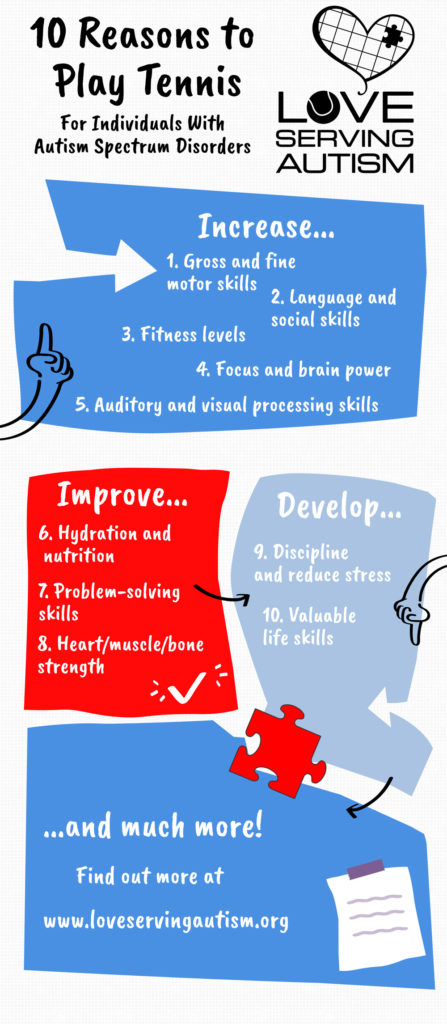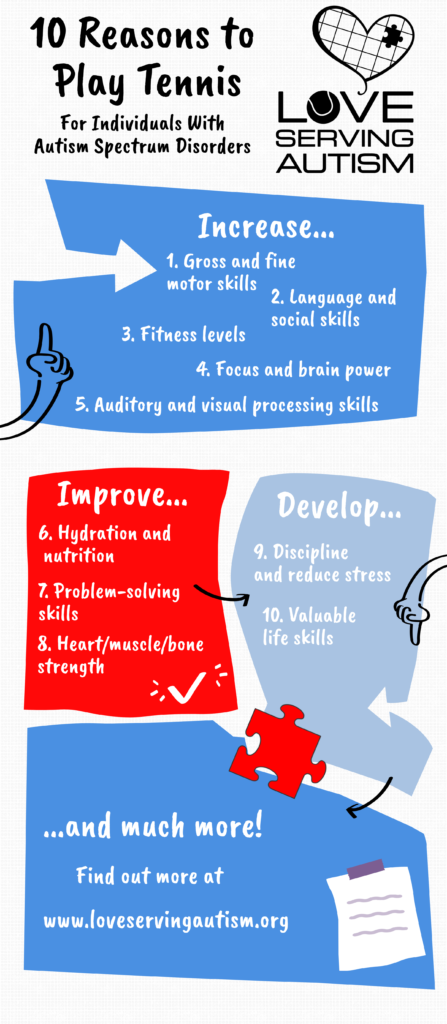
There are many reasons for both neurotypical and neurodivergent individuals to play this amazing sport. In this blog entry, I will list my top favorite reasons why individuals with autism will benefit from participating in tennis activities.
 Tennis increases fine motor and gross motor skills.
Tennis increases fine motor and gross motor skills.
Children and adults with autism may demonstrate difficulty with activities such as catching, throwing and hand-eye coordination drills and games. They may also need physical and verbal prompts to assist with learning how to add the movement and footwork to their tennis strokes. To increase these skills, we implement as much repetition as possible to improve motor planning and body/spatial awareness. Many of our tennis students enjoy practicing with a ball machine or a portable wall while aiming at specific targets to improve shot timing and accuracy.
Increase Fitness Levels & Increase Heart/Muscle/Bone Strength
Children and adults with autism increase their fitness levels and improve heart, muscle and bone strength by participating in the sport of tennis. The parents of tennis program participants are often very surprised that their child enjoys the exercise on the tennis court because the children typically are more inclined to playing video games or participate in indoor activities.
Improve Hydration and Nutrition
The children and adults in the tennis program quickly learn the importance of proper hydration and nutrition to sustain their energy during the classes, especially in the Florida heat. The tennis coaches and volunteers provide multiple hydration breaks throughout the 1 hour sessions as well as recommend the child or adult is hydrated before and after tennis. Individuals with autism are more inclined to suffer from seizures and heat may be a trigger, which is why it is essential for the tennis participants to stay hydrated.
Increase Auditory and Visual Processing Skills
Individuals with autism are visual learners. Tennis is a very repetitive, visual sport that increases both visual and auditory processing skills. Volunteers are trained to use visual supports (ie-picture exchange communication systems) to engage with the tennis participants. Visual schedules are provided during the tennis sessions because the children and adults like to adhere to familiar, consistent routines.
Improve Problem-Solving Skills & Increase Focus and Brain Power
Even though tennis is a very repetitive sport, it is often difficult to predict the location of where the opponent is returning the next tennis ball. Playing in tennis drills and matches create opportunities for spontaneous thinking for both on and off the tennis court. Tennis requires the brain to be creative, and it incorporates tactical thinking and planning which develops brain power. Tennis participants with autism may occasionally demonstrate frustration when the drill or game isn’t played exactly as expected or taught. This is a wonderful teaching moment for these individuals about the importance of flexibility, letting go of expectations and moving onto the next point or game.
Increase Language and Social Skills
Tennis is a social sport because an individual must play against an opponent in singles competition and share a team with a partner for doubles. Many of our program participants would prefer to play tennis alone but they are taught the rules and format at the beginning of each program. The more advanced players who learn to rally against an opponent quickly learn to enjoy the repetitive engagement and are less anxious each time they compete with others in the sport.
Receptive and expressive language skills are demonstrated through requesting and commenting while playing the sport. For individuals on the autism spectrum who are non-verbal, the use of visuals and communication technology are essential components for communication success. Approximately 30% of our tennis program participants are non-verbal and require a communication system to assist with expressing their wants and needs. For example, one of the tennis participants brings her classroom iPad to an after-school tennis program. She opens the ProLoquo app and initiates communication and answers staff questions by selecting core vocabulary. When she needs a water break, this student selects “water” on her iPad, take a water break for a few minutes, then return to the class.
Develop Discipline and Reduce Stress
Tennis develops discipline for routines, which is typically a very strong trait for individuals with ASD. As a collegiate and professional player myself, I developed a strict routine before each tennis match to physically and mentally prepare for my competition. The routine also decreased anxiety and increased my confidence before tournaments. Tennis provides a therapeutic outlet to reduce stress. If a program participant displays frustration or anxiety, we often teach the child or adult to take deep breaths or to run a few laps around the tennis court for self-regulation. Once the participant is ready again to participate in the tennis program, he/she is invited to join the group.
Develop Discipline and Reduce Stress
Tennis is a sport full of life’s lessons. It teaches individuals with ASD about valuable life skills. A few life skills we teach during the tennis program include integrity, sportsmanship, leadership, responsibility, perseverance and confidence. We teach one life skill per week for after-school and community-based tennis programs. The goal is for the tennis program participants to learn new life skills and for these skills to generalize into the home, school and community environments which is essential for functional independence and overall well-being.
I truly encourage children and adults with autism to engage in the sport of tennis for it’s life-long therapeutic benefits, both on and off the tennis court.
For additional information about the benefits of tennis for individuals with autism, please contact:
Lisa@loveservingautism.org or (561) 331-1903
Thank You,
Lisa Pugliese
Love Serving Autism, Founder

